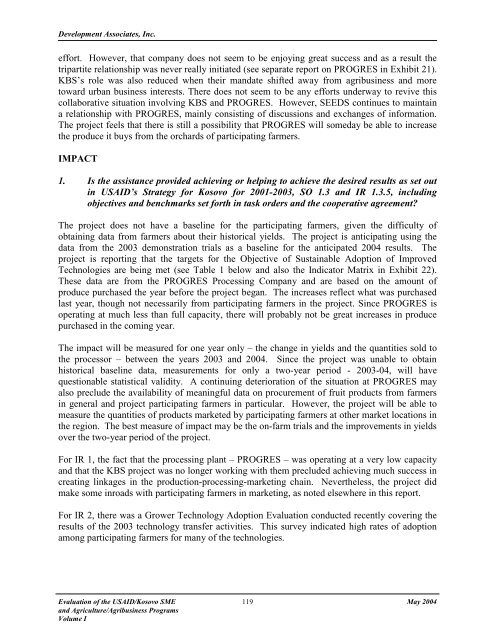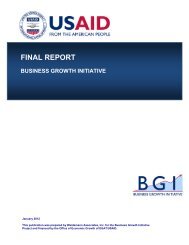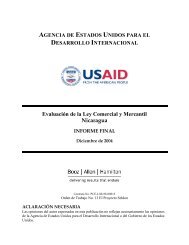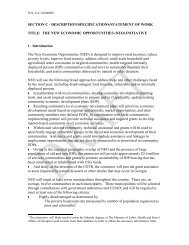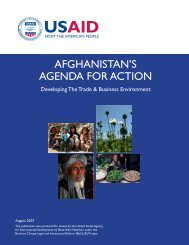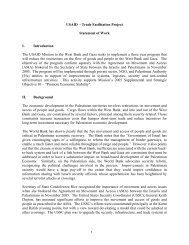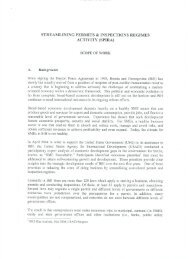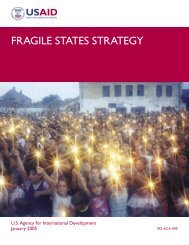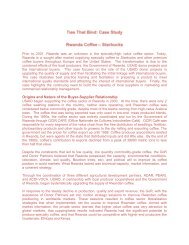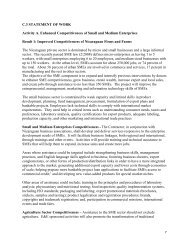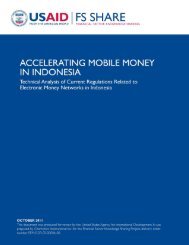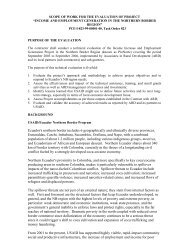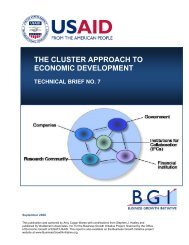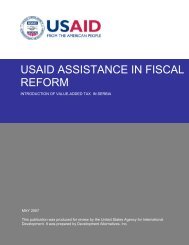Evaluation of the USAID-Kosovo SME and Agriculture - Economic ...
Evaluation of the USAID-Kosovo SME and Agriculture - Economic ...
Evaluation of the USAID-Kosovo SME and Agriculture - Economic ...
Create successful ePaper yourself
Turn your PDF publications into a flip-book with our unique Google optimized e-Paper software.
Development Associates, Inc.effort. However, that company does not seem to be enjoying great success <strong>and</strong> as a result <strong>the</strong>tripartite relationship was never really initiated (see separate report on PROGRES in Exhibit 21).KBS’s role was also reduced when <strong>the</strong>ir m<strong>and</strong>ate shifted away from agribusiness <strong>and</strong> moretoward urban business interests. There does not seem to be any efforts underway to revive thiscollaborative situation involving KBS <strong>and</strong> PROGRES. However, SEEDS continues to maintaina relationship with PROGRES, mainly consisting <strong>of</strong> discussions <strong>and</strong> exchanges <strong>of</strong> information.The project feels that <strong>the</strong>re is still a possibility that PROGRES will someday be able to increase<strong>the</strong> produce it buys from <strong>the</strong> orchards <strong>of</strong> participating farmers.IMPACT1. Is <strong>the</strong> assistance provided achieving or helping to achieve <strong>the</strong> desired results as set outin <strong>USAID</strong>’s Strategy for <strong>Kosovo</strong> for 2001-2003, SO 1.3 <strong>and</strong> IR 1.3.5, includingobjectives <strong>and</strong> benchmarks set forth in task orders <strong>and</strong> <strong>the</strong> cooperative agreement?The project does not have a baseline for <strong>the</strong> participating farmers, given <strong>the</strong> difficulty <strong>of</strong>obtaining data from farmers about <strong>the</strong>ir historical yields. The project is anticipating using <strong>the</strong>data from <strong>the</strong> 2003 demonstration trials as a baseline for <strong>the</strong> anticipated 2004 results. Theproject is reporting that <strong>the</strong> targets for <strong>the</strong> Objective <strong>of</strong> Sustainable Adoption <strong>of</strong> ImprovedTechnologies are being met (see Table 1 below <strong>and</strong> also <strong>the</strong> Indicator Matrix in Exhibit 22).These data are from <strong>the</strong> PROGRES Processing Company <strong>and</strong> are based on <strong>the</strong> amount <strong>of</strong>produce purchased <strong>the</strong> year before <strong>the</strong> project began. The increases reflect what was purchasedlast year, though not necessarily from participating farmers in <strong>the</strong> project. Since PROGRES isoperating at much less than full capacity, <strong>the</strong>re will probably not be great increases in producepurchased in <strong>the</strong> coming year.The impact will be measured for one year only – <strong>the</strong> change in yields <strong>and</strong> <strong>the</strong> quantities sold to<strong>the</strong> processor – between <strong>the</strong> years 2003 <strong>and</strong> 2004. Since <strong>the</strong> project was unable to obtainhistorical baseline data, measurements for only a two-year period - 2003-04, will havequestionable statistical validity. A continuing deterioration <strong>of</strong> <strong>the</strong> situation at PROGRES mayalso preclude <strong>the</strong> availability <strong>of</strong> meaningful data on procurement <strong>of</strong> fruit products from farmersin general <strong>and</strong> project participating farmers in particular. However, <strong>the</strong> project will be able tomeasure <strong>the</strong> quantities <strong>of</strong> products marketed by participating farmers at o<strong>the</strong>r market locations in<strong>the</strong> region. The best measure <strong>of</strong> impact may be <strong>the</strong> on-farm trials <strong>and</strong> <strong>the</strong> improvements in yieldsover <strong>the</strong> two-year period <strong>of</strong> <strong>the</strong> project.For IR 1, <strong>the</strong> fact that <strong>the</strong> processing plant – PROGRES – was operating at a very low capacity<strong>and</strong> that <strong>the</strong> KBS project was no longer working with <strong>the</strong>m precluded achieving much success increating linkages in <strong>the</strong> production-processing-marketing chain. Never<strong>the</strong>less, <strong>the</strong> project didmake some inroads with participating farmers in marketing, as noted elsewhere in this report.For IR 2, <strong>the</strong>re was a Grower Technology Adoption <strong>Evaluation</strong> conducted recently covering <strong>the</strong>results <strong>of</strong> <strong>the</strong> 2003 technology transfer activities. This survey indicated high rates <strong>of</strong> adoptionamong participating farmers for many <strong>of</strong> <strong>the</strong> technologies.<strong>Evaluation</strong> <strong>of</strong> <strong>the</strong> <strong>USAID</strong>/<strong>Kosovo</strong> <strong>SME</strong> 119 May 2004<strong>and</strong> <strong>Agriculture</strong>/Agribusiness ProgramsVolume I


